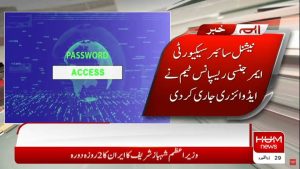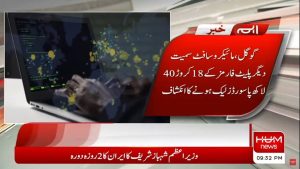Password Panic: Pakistan Warns Users After 184 Million Credentials Leaked
184M Passwords Leaked: PKCERT Issues Urgent Alert!
Pakistan’s cybersecurity team issues a critical warning to users after 184 million passwords were leaked in a global data breach. Learn what happened and how to protect yourself.
Introduction
Imagine waking up one day only to find out your email, bank account, and even health records are floating around in a public database. Scary, right? That’s exactly what’s unfolding in the digital world as Pakistan’s National Cyber Emergency Response Team (PKCERT) issues a red-alert warning to internet users.
A staggering 184 million passwords have been leaked in one of the largest data breaches to date, affecting platforms like Google, Microsoft, and Facebook. The incident has thrown a spotlight on global cybersecurity cracks — and it’s got Pakistanis scrambling to reset passwords.
So, what’s going on? And more importantly, what should you do about it? Let’s dive into this password pandemonium.



What Happened in the Mega Breach?
A Breach Bigger Than Ever
Cybersecurity researcher Jeremiah Fowler discovered a publicly accessible and unencrypted database online. We’re talking about more than 1.8 billion user records, including:
Usernames
Passwords
Email addresses
Account URLs
Banking and health-related credentials
And the kicker? No password protection. No encryption. Just… open. For anyone to see.
Infostealer Malware: The Silent Thief
The breach likely stems from infostealer malware, a type of malicious software that quietly gathers login credentials and personal info from infected devices. It’s sneaky, fast, and dangerous.
Some of the platforms compromised include:
Social media sites (Facebook, Instagram, Twitter)
Banking portals
Government portals
Health and wellness platforms
Email services like Gmail and Outlook
Yup, it’s pretty much a who’s who of your digital life.
Pakistan Steps Up: PKCERT Issues Warning
Upon learning about the breach, PKCERT issued an urgent cyber threat advisory, warning citizens of Pakistan to update passwords immediately.
Here’s what they recommend:
1. Change all your passwords, especially for sensitive accounts.
2. Enable two-factor authentication (2FA) where possible.
3. Avoid suspicious links or emails.
4. Monitor your accounts for any unusual activity.
> “Treat this breach as if your own data was compromised,” says a PKCERT official.
Why This Breach is a Huge Deal for Pakistan
Pakistan isn’t new to cybersecurity challenges, but this one’s on a different level.
Cybersecurity in Pakistan has long been a growing concern. But when you’re dealing with 184 million leaked passwords, it turns into a national issue.
A breach of this scale could:
Jeopardize banking systems
Leak NADRA (National Database & Registration Authority) information
Impact e-government services
Hurt online businesses and e-commerce platforms
Undermine trust in digital infrastructure
And let’s not forget the ripple effect — when one country’s data is exposed, it can be used in phishing scams, identity theft, and even international cyberwarfare.
Is Your Data at Risk? How to Check
1. Use Trusted Tools
Use sites like:
HaveIBeenPwned.com
Firefox Monitor
Just enter your email to check if it’s been compromised.
2. Look for Red Flags
Unexpected logins or password reset attempts
Messages sent from your accounts without your knowledge
Locked-out sessions
3. Update Recovery Info
Make sure your backup email and phone number are correct.
How to Create Strong Passwords in 2025
Let’s face it, “123456” or “password” just won’t cut it anymore.
Here’s how to stay ahead:
Use passphrases instead of passwords (e.g., MyDogEatsBiryaniEveryFriday!)
Combine upper- and lower-case letters, numbers, and symbols
Don’t reuse passwords across accounts
Use a password manager like 1Password, Bitwarden, or LastPass
Two-Factor Authentication (2FA): Your Digital Shield
2FA adds an extra layer of security by requiring a second step to verify your identity.
Types of 2FA:
SMS-based codes
Authenticator apps (Google Authenticator, Authy)
Biometric verification (fingerprint, facial recognition)
Pro tip: Avoid relying on SMS if possible. SIM-swap fraud is a thing now!
The Bigger Picture: Global Cybersecurity Failing Us?
The fact that such a massive trove of data was unprotected and open to the internet is a failure at multiple levels.
Companies offering data breach protection need to seriously up their game. Many are selling security, but not implementing it properly.
If you suspect a breach, report it to PKCERT or your local law enforcement agency.
Don’t Rely on Luck — Take Action Now!
You don’t have to be a hacker to stay safe. You just need to be proactive.
Checklist: What To Do Today
[ ] Change your email and social media passwords
[ ] Enable 2FA on all important accounts
[ ] Don’t click on shady links or emails
[ ] Educate your friends and family — especially the non-tech-savvy ones
[ ] Regularly backup important data
FAQs: All About the 184M Password Leak
Q1: Was my Google account compromised?
Maybe. The breach included Google credentials. Use HaveIBeenPwned to check.
Q2: What’s the biggest danger if my data is leaked?
Identity theft, unauthorized purchases, or even targeted phishing attacks.
Q3: Can I recover a hacked account?
In most cases, yes. Use the platform’s recovery tools, update all details, and notify support.
Q4: Should I stop using online banking?
Not necessarily, but be extra cautious. Use secure connections, 2FA, and monitor transactions regularly.
Q5: Why didn’t the hosting company act sooner?
The file was removed after being reported, but how long it was online is unknown. This delay shows why end-users must remain vigilant.
Why You Should Never Wait to Update Passwords After a Breach
When a breach is confirmed, time is of the essence. Waiting even a day could be costly. Hackers act fast, so should you.
As cyber threats in 2025 evolve, so must our defenses. AI-powered phishing, deepfakes, and more sophisticated malware are now part of the game.
Conclusion: The Password Le ak We Can’t Ignore
The 184 million leaked passwords are more than just numbers. They represent people — their emails, their finances, their private lives.
While the origin of the breach remains murky, the lesson is crystal clear: never take your online safety for granted.
Pakistan has taken a step in the right direction by alerting users, but the responsibility lies with each one of us. So, don’t just read about this breach and move on. Act. Change your passwords. Enable 2FA. Educate others.
Because the next breach? It could be even bigger — and your digital life might not get a second chance.